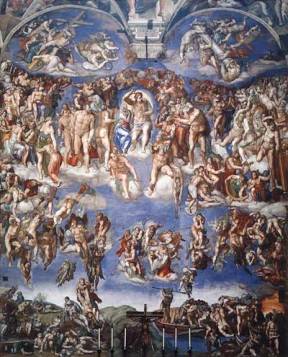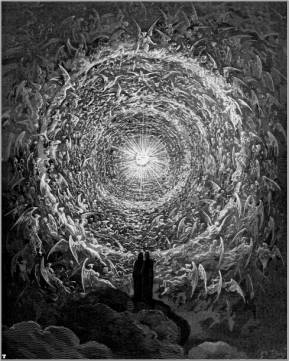
LITR 5737: Literary & Historical Utopias
Historical Presentation 2005
Daniel Robison
Heaven as Utopia

Michelangelo’s “The Last Judgment”

Dore’s “Dante’s The Highest Heaven”
In considering the concept of Heaven as a utopia, we will consider five areas:
1) The View of the Early Church
2) The Contemporary Tradition
3) Christian Eschatology
4) Millennialism and Utopianism
5) Problems with a Heavenly Utopia
I. The View of the Early Church
Christ Armstrong writes that heaven “has been used to motivate people of many faiths in many way: To instill character and strengthen resolve. To build community and spur change. To steel terrorists and comfort victims. It is easy to imagine this word . . . on the lips of both the hijackers of American Airlines Flight 11 and many of the passengers.” As can be seen, heaven has different meanings to different people, and so it has over time.
v The apostles believe in “heaven-as-divine-communion,” with the word “heaven” being “often used to stand for God himself” (Armstrong ).
v Jesus promised his followers that he went “’to prepare a place for you . . . that where I am you may also be” (John 14: 3-4).
v Paul stated that he had been “lifted up into ‘the third heaven,’ where he experienced ‘things so astounding’ that, to the great disappointment of his readers ever since, ‘they cannot be told’” (Armstrong).
v In The Martyrdom of Perpetua and Felicity and in pictures found on the walls of the catacombs in Rome, the Christians of the third century demonstrated their belief that when we get to heaven we will we be with our loved ones.
v By the early fifth century, Christian thought returned to a more God-centered heaven where the “tired pilgrim could finally find rest in God.”
v Augustine of Hippo describes heaven as “an embrace of God, and an embrace of other people who love Christ.”
II. The Contemporary Tradition
Modern Christians continue to view heaven as “the dwelling-place of God. Heaven is where the glory of God is expressed in pristine clarity” and where “believers will have fellowship with God and with each other in a perfect environment” (Elwell).
v Pope John Paul II said that “’Heaven is neither an abstraction nor a physical place in the clouds, but a living, personal relationship with [God]…This final state, however, can be anticipated…in the gift of the self through fraternal charity’” (“Heaven”)
v The Eastern Orthodox Church teaches that heaven and hell are the same “’place’” but that which one believers experience depends on their “perception of the place,” and that “determined by one’s relationship to God.”
v Protestantism holds that in heaven “the blessed will enjoy the never-ending increase in the knowledge of God” and “increase in the knowledge and enjoyment of all things, forever” (“Christian”).
III. Christian Eschatology
This “is the study of Christian beliefs concerning final events and ultimate purposes” (“Christian”). This is the teaching of the second coming, but whether with the second coming or in heaven after death, believers will find “the elimination of disease, poverty, injustice and death itself.” For most Christians, this “belief in life after death [is] a central and indispensable tenet of their faith.” As a part of eschatology is the is the concept of millennialism, which is the belief that Jesus will return and rule on earth of a thousand years.
v Pre-millennialism—belief that Christ will return and rule for a thousand years prior to His final judgment. This includes belief in a rapture that occurs before, during, or after the seven-year tribulation, Armageddon, the final battle between Christ and Satan, and the Last Judgment, where everyone will go to either heaven or hell.
v Post-millennialism—belief that “the millennium is a future golden age, when Christian saints will reign over all of the earth, before the return of Christ and the end of the world.”
v Amillennialism—belief that the thousand-year period refers to “the entire period following the resurrection of Christ until his return.”
v The New Jerusalem—“a new characteristic of heaven, perfectly suited to extend God’s glory….The essential feature of the New Jerusalem is the intimate presence of God among his people” (Elwell).
IV. Millennialism and Utopianism
“In the wake of early millennial thinking, the Three Ages philosophy developed. Making use of the dogma of the Trinity, the Italian monk and theologian Joachim of Fiore claimed that all of human history was success of three ages: the Age of the Father (the Old Testament), the Age of the Son (the New Testament), and the Age of the Holy Spirit (the age of love, peace, and freedom)” (“Millennialism”).
v The French Revolution “usher[ed] in the millennial age of reason.”
v The ideas of Hegel and Marx both “carried strong millennial overtones.”
v Hitler believed in the Third Reich, which followed the reichs of the Holy Roman Empire and the German Empire under the Hohenzollerns.
V. Problems with a Heavenly Utopia
George Orwell argues that “[a]ll efforts to describe permanent happiness…have been failures. Utopias…have been common in literature of the past three or four hundred years but the ‘favourable’ ones are invariably unappetizing, and usually lacking in vitality as well.”
Concerning heaven, he writes:
v “Heaven is as great a flop as Utopia though Hell occupies a respectable place in literature, and has often been described most minutely and convincingly.”
v “It is commonplace that the Christian Heaven, as usually portrayed, would attract nobody. Almost all Christian writers dealing with Heaven either say frankly that it is indescribable or conjure up a vague picture of gold, precious stones, and the endless singing of hymns.”
v “But what it could not do was to describe a condition in which the ordinary human being actively wanted to be. Many a revivalist minister, many a Jesuit priest…has frightened his congregation almost out of their skins with his word-pictures of Hell. But as soon as it comes to Heaven, there is a prompt falling-back on words like ‘ecstasy’ and ‘bliss,’ with little attempt to say what they consist in.”
Kenneth S. Kantzer, a contemporary Christian thinker, seems to agree with Orwell and argues that as Christians “[w]e cannot imagine [heaven], we cannot anticipate it, and, therefore, we cannot long for it as the ultimately attractive lure to the truly good life.”
v In Paradise Lost, Milton’s “meter grips us in a way that is emotionally inescapable and unforgettable, while Paradise Regained leaves us with an insipid taste. Heaven sounds boring. There is nothing to do—just ‘being holy and loving God’ is not enough for most people.”
v “Heaven is portrayed as essentially unlike earth—no sorrow, no sighing, no tears, no pain, no sin.”
v “The one positive theme that runs throughout the Bible is that in heaven we will be with God; and the horror of hell is that it will be a place without God.”
v “At death, or at the Second Coming, we shall meet God face to face and, for the first time, see him as he really is, and then, for the first time also, see sin as it really is. Then, and only then, will the infinite joy and attractiveness of God and his good absorb our soul. In sharpest contrast, a sense of the infinite ugliness and utter repulsiveness of sin and evil will also penetrate our hearts and minds. And so we shall become like God and truly long to be with him in his good kingdom of love and peace and joy.”
Works Cited
Armstrong, Chris. “Christian History Corner: How the Early Church Saw Heaven.” Christianity Today 9 Aug. 2002. 19 June 2005 http://www.christianitytoday.com/ct/2002/130/52.0.html.
“Christian Eschatology.” Wikipedia, the Free Encyclopedia. 14 June 2005. 19 June 2005 http://en.wikipedia.org/wiki/Christian_eschatology.
Elwell, Walter A. “Entry for ‘Heaven, Heavens, Heavenlies.’” Evangelical Dictionary of Theology. 2005. Crosswalk.com. 19 June 2005. <www.biblestudytools.net/Dictionaries/BakersEvangelicalDictionary/bed.cgi>.
“Heaven.” Wikipedia, the Free Encyclopedia. 18 June 2005. 19 June 2005 http://en.wikipedia.org/wiki/Heaven.
Kantzer, Kenneth S. “Afraid of Heaven.” Christianity Today 6 June 2003. 19 June 2005 http://www.christianitytoday.com/ct/2003/122/53.0.html.
“Millennialism.” Wikipedia, the Free Encyclopedia. 8 June 2005. 19 June 2005 http://en.wikipedia.org/wiki/Millennialism.
Orwell, George. “Can Socialists Be Happy?” 20 Dec. 1943. Rpt. In Literature Network. 2005. 19 June 2005 http://www.online-literature.com/orwell/895.
Additional Resources
“What Will Heaven Be Like?”
http://www.christianitytoday.com/ct/2003/122/51.0.html
“The Millennium”
http://www.stgabrielokc.org/Glossary_Items/millennium.htm
“The Millennium”
http://www.holytrinitylyonsdown.org.uk/sermons/2004/09/Rev20_1-.html
“A Present of Future Millennium?”
http://www.the-highway.com/millennium_Riddlebarger.html
“The Millennium”
http://www.baptiststart.com/print/millennium.html